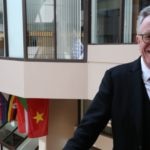A less than conventional economist
If a person’s tweets reflect their interests, there can be little doubt as to what makes Martin Ravallion tick. His account directs followers to articles on the exodus of Syria’s refugees; the importance of the world’s poorest having access to information; campaigns to tackle child malnutrition. Ravallion, an economist, is aware that his vision of economic science “is not shared by the majority.” And he quotes historian Max Hartwell: “Economics is, in essence, the study of poverty.”

With this philosophy, Ravallion would become one of the leading poverty experts working for the World Bank. And creator of the first international poverty benchmark, vital for monitoring progress in the fight for its eradication. The jury has granted him the BBVA Foundation Frontiers of Knowledge Award in the Development Cooperation category, describing him in its citation as “the world’s leading researcher on the measurement of poverty,” responsible for work that has contributed to understanding its causes and solutions.
Ravallion was lead author of the paper that in 1991 set the global poverty line at one dollar a day. This amount, of which he says “nothing below that is reasonable to assure survival,” has since been revised up in line with the cost of living to 1.90 dollars at 2011 prices.
Ravallion and his team arrived at the figure after studying national thresholds in some of the world’s poorest countries, and restating them by reference to purchasing power parity (PPP), an exchange rate that unifies goods and services prices worldwide.

In 2015, according to the World Bank, 700 million people globally were living below the poverty line. The fact that this is 200 million fewer than in 2012 encourages Ravallion to optimism about attaining one of the sustainable development goals: to eradicate extreme poverty by 2030. “I believe we are on the right road, to judge from the progress made by many developing countries in the last few decades.”
It was his research which revealed that this improvement was driven above all by economic growth, a vital force for poverty alleviation. He insists, however, that growth alone may not be enough: “The main reason for people escaping poverty is aggregate economic growth. But when you look more closely, you see that there are other factors involved, most notably inequalities in human development (basic health and education) and access to credit for financing investment.”
Far from crying victory, then, Ravallion reminds us that the fight against poverty confronts multiple threats including climate change, the global recession and widening inequality. This last factor is crucial: “Inequality may prevent a billion people from being lifted out of poverty in the next fifteen years,” he affirms, even in a context of economic growth.
The typical case is that economic growth benefits poor people. But there are exceptions. Particularly when inequality is high, poverty reduces far more slowly — Ravallion
His figures show that while many households have improved their standard of living and climbed above the poverty line, the gap that separates those with least is steadily augmenting: “There is a real risk that the poorest are being left behind, because in this period their standard of living has risen by the barest minimum, much less than the average.” Also, many of those who made it over the threshold are “bunched up just above it,” at risk of falling back, and “remain relatively poor by the standards of the countries they live in.”

Augusta Flor. Fundación Microfinanzas BBVA
Martin Ravallion turns to his own childhood to illustrate the role of social policies as a supplement to growth. Born in Australia in 1952, he was brought up by a single mother, “and we received a lot of help from progressive social policies that supported the education of children from all backgrounds, including disadvantaged families. Without them, I couldn’t have continued my studies.”
After graduating from the University of Sydney, he earned a PhD from the London School of Economics (United Kingdom) in 1981, then went on to work at the University of Oxford and the Australian National University. In 1988, he joined the World Bank, where his work and example drew hundreds of researchers to the previously neglected area of poverty studies. After years leading the Bank’s Development Research Group, he left in 2013 to take up the Edmond D. Villani Chair of Economics at Georgetown University in Washington. His latest book, The Economics of Poverty, sets out in its 700 pages the lessons learned in the course of his career.
One such lesson is that “there are many reasons” beyond the strictly moral for trying to defeat poverty: “When poverty and inequality are rife, it is much harder for the whole economy to develop. There is quite a strong pattern in the data whereby developing countries that start with less absolute poverty tend to see higher rates of growth.”
In the light of his experience, it is perhaps no surprise that what Martin Ravallion enjoys most about his work is “using my analytical skills to help address important social problems. For me, that is the great attraction of economics as a subject.”